Menghuan Grand Golden Pagoda is located on the top of Leiya Rang Mountain beside the Peacock Lake in the southeast of Mangshi City, Dehong Dai and Jingpo Autonomous Prefecture, Yunnan Province. It is a national 4A-level tourist attraction and a classic building among the pagodas and temples of Theravada Buddhism. The scenic area covers an area of about 16,000 square meters. The core building, the Golden Pagoda, is 76 meters high with a base diameter of 50 meters. Composed of three parts: the base, the body and the spire, the main structure is made of steel covered with gold foil, using 1.3 tons of gold. It glitters brilliantly in the sun and is known as "China's No.1 Golden Pagoda" and "Asia's No.1 Hollow Pagoda". The scenic area integrates Dai religious culture, architectural art and natural landscapes. Climbing to the top offers a panoramic view of Mangshi City.
History and Culture
The history of Menghuan Grand Golden Pagoda can be traced back to the Qing Dynasty. The original pagoda was first built in 1803 but was later destroyed due to wars. The current pagoda was reconstructed in 2004, designed under the auspices of Venerable Dao Shuren, Vice-Chairman of the Buddhist Association of China, and completed and inaugurated in 2007. "Meng Huan" means "City of Dawn" in the Dai language, which echoes Mangshi's alias "City of Dawn" and reflects the Dai people's pursuit of light and hope. The Golden Pagoda is an important religious activity site for the Dai people in Mangshi. During annual Dai festivals such as the Water-Splashing Festival and the Chuwa Festival (the end of the Buddhist Lent), local believers and tourists gather here to hold rituals like praying for blessings and making offerings to Buddha, carrying profound ethnic culture and religious beliefs.
Major Attractions
Main Structure of the Golden Pagoda
The main body of the Golden Pagoda is 76 meters high, and its spire, consisting of a treasure vase, a treasure canopy, a treasure top and other components, reaches 23 meters. The pagoda body is bell-shaped, with a small pagoda built on each of its four sides, symbolizing the "Four Noble Truths" of Buddhism. The interior of the pagoda is hollow, enshrining the statue of Sakyamuni Buddha and Buddhist sacred relics such as the Pali Canon written on palm leaves. Surrounding the base of the pagoda are 16 exquisite Buddha reliefs, depicting Buddhist stories and elements of Dai culture. The entire building uses 1.3 tons of gold and more than 200 tons of copper, serving as a model of the combination of Dai architectural art and Buddhist culture.
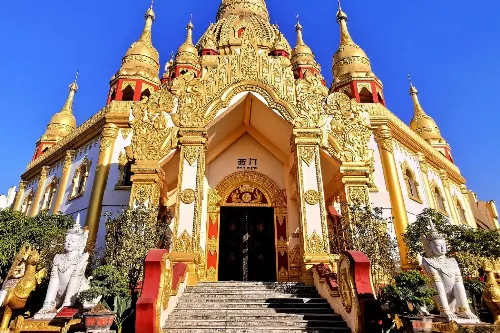
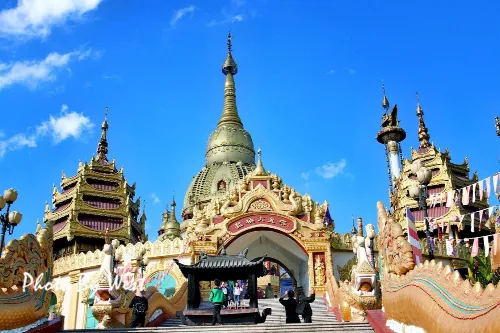
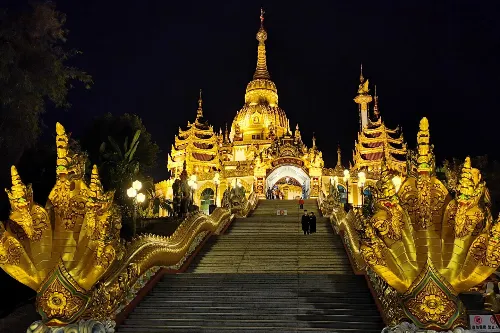
Observation Platform
At the foot of the Golden Pagoda, there is a circular observation platform covering an area of about 3,000 square meters. With a broad view, the platform allows a 360-degree overlook of Mangshi urban area, Peacock Lake and the surrounding mountains. In the early morning or evening, visitors can enjoy the magnificent scenery of the pagoda bathed in the golden light of the sunrise or dyed by the afterglow of the sunset, making it an ideal spot for photographers to take photos.
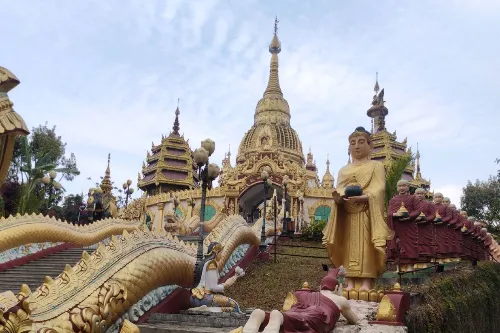
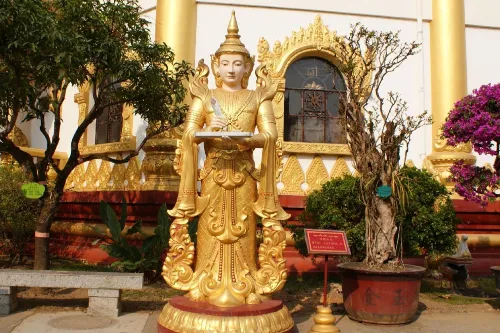
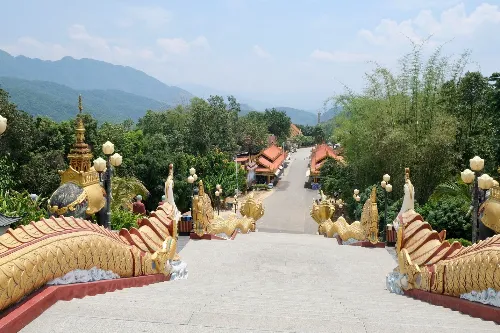
Buddhist Culture Square
At the entrance of the scenic area lies the Buddhist Culture Square, covering an area of about 5,000 square meters. In the center of the square stands a 9-meter-high four-faced Buddha statue. Around it are buildings with Dai characteristics, such as octagonal pavilions and corridors. The corridors display Theravada Buddhist murals and graphic materials about Dai culture, where visitors can learn about Buddhist doctrines and the history and culture of the Dai people.
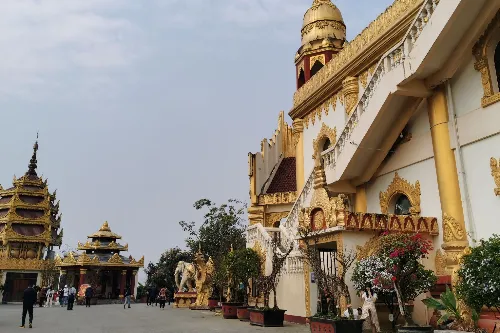
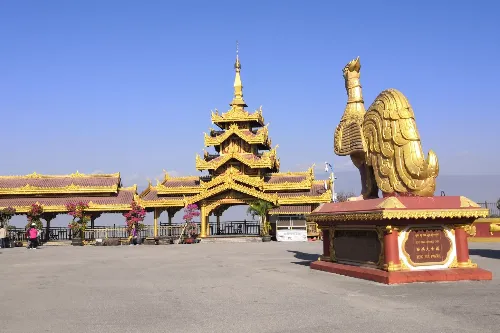
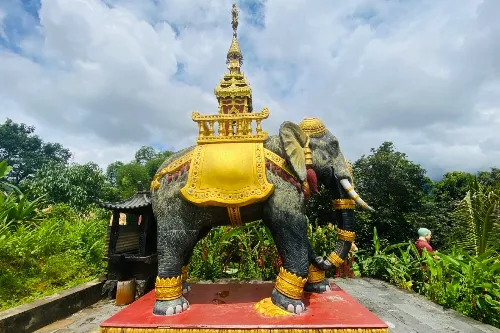
Tour Route
Classic Half-Day Tour Route: Arrive at the scenic area at 09:00, first visit the Buddhist Culture Square (09:00-09:30) to learn about Dai Buddhist culture; then climb the steps to the main structure of the Golden Pagoda (09:30-11:00), visit the Buddha statues and reliefs inside the pagoda, and climb to the top for a panoramic view of Mangshi; go to the Observation Platform at 11:30 (11:30-12:00) to take photos of the Golden Pagoda with the city scenery; end the trip at 12:30 and go to the nearby area of the scenic spot to taste Dai-style foods such as "Sapie" (a kind of Dai cold noodle soup) and "Paoluda" (a Dai sweet drink with coconut milk, sago and fried dough sticks).
Travel Tips
- Wear comfortable sports shoes: Climbing the pagoda requires ascending about 200 steps. It is recommended to wear non-slip sports shoes and avoid high-heeled shoes.
- Take sun protection measures: Mangshi has strong sunlight. Please bring sunscreen, a sun hat and sunglasses. Mosquito repellent can be prepared in summer.
- Visit during off-peak hours: There are more tourists on weekends and holidays. It is recommended to enter the scenic area before 8:00 a.m. or after 4:00 p.m. on workdays to avoid the high-temperature period.
- Respect religious customs: Remove shoes when entering the pagoda, wear clothes that cover the shoulders and knees, do not make noise, and turn off the flash when taking photos.
Notes
- Safety Warning: There is no guardrail at the edge of the pagoda base platform. Please pay attention to safety when taking photos and do not get close to the edge.
- Cultural Relic Protection: Touching or carving on the pagoda's reliefs and Buddha statues is prohibited. Violators will be fined 200-500 yuan.
- Religious Etiquette: When encountering religious activities, keep a distance and do not participate in or photograph the believers' rituals without permission.
- Take care of personal belongings: There is a large flow of people at the entrance of the scenic area and along the route to the pagoda. Please take care of items such as mobile phones and wallets to avoid loss.
- Night Lighting: When climbing the pagoda at night, please pay attention to the safety of the steps. The scenic area has complete lighting facilities, but it is recommended to go with companions.
Transportation
- Bus: Take Bus No. 3 in Mangshi urban area to the "Menghuan Grand Golden Pagoda" stop, then walk for 5 minutes to reach the entrance of the scenic area. The fare is 2 yuan per person. The first bus departs at 06:30 and the last bus at 18:30.
- Taxi: Take a taxi from Mangshi Airport or Railway Station to the scenic area, which takes about 15 minutes and costs about 20-30 yuan.
- Self-driving: Search for "Menghuan Grand Golden Pagoda" on the navigation app. Drive along Menghuan Road from Mangshi urban area for about 3 kilometers. The scenic area has a parking lot, and the parking fee for cars is 5 yuan per day.
Opening Hours
Open all year round, from 07:30 to 21:30 daily (admission stops at 21:00). The Golden Pagoda is brightly lit at night and open until 21:30 for visitors to enjoy the night view. The opening hours may be adjusted during special religious activities. It is recommended to check the scenic area announcement before traveling.
Ticket
Visiting the area outside the pagoda is free, while admission to the inside of the pagoda is 40 yuan per person. The price is subject to the actual fee of the scenic area. As of May 19, 2025, no official WeChat public account of the scenic area was found on WeChat.
Online Booking
Click here to jump to the Trip.com ticketing platform for ticket purchase.